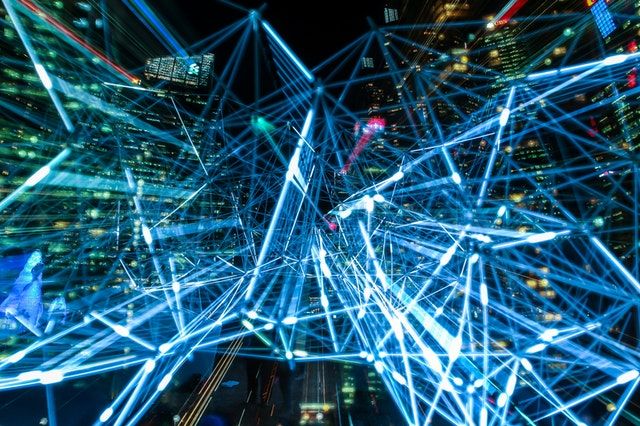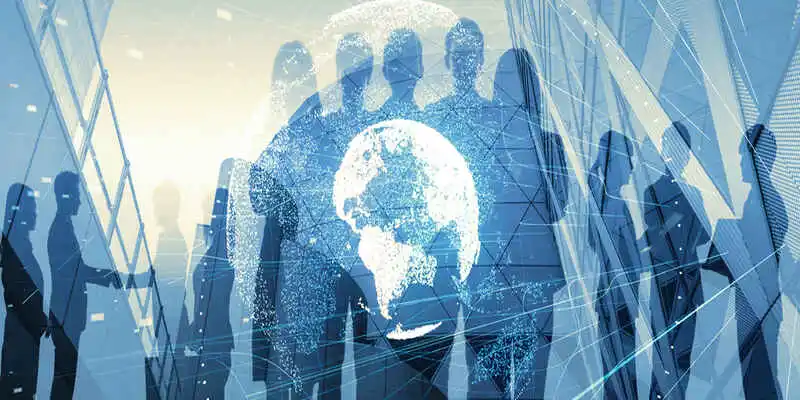Artificial Intelligence in HR
Various corporations and businesses are rapidly adopting AI in order to boost their profits. Artificial intelligence in HR has the potential to solve problems in practically every business, including sales and management.

Artificial intelligence has influenced the world since its arrival. Various companies and businesses are adopting it exponentially to improve their business growth. Artificial intelligence in HR offers potential solutions for almost every industry, including sales and management departments. But the question is, can the HR industry use this technology too? will AI take over HR too?
AI IN HR: IMPACT OF AI ON HR AND CURRENT GLOBAL STATS
Josh Bersin, founder and principal of Bersin by Deloitte, said that "It is now popping into almost every piece of software." Based on their research, about 40% of businesses use artificial intelligence in HR alone. Further, 33% of employees’ jobs will become augmented in future because of AI. Personnel Today shared a report in 2017, according to which about 38% of enterprises have adopted AI in their workplaces, and 62% are expected to introduce it in the year. Some companies are adopting AI at 2x faster than others, and it is currently 50% of workers, and the number was 32% last year.
By 2027, the HR analytics market size will approach $6.29 billion globally, according to Grand View Research, with a CAGR of 14.2% by 2027 from 2020.
HOW DOES AI HELP ADDRESS COMMON HR CHALLENGES?
Talent Acquisition
Effective recruiting has a significant position in modern businesses as it allows industries to grow and add value to their respective organizations. The present issues in acquiring the right talent for organizations are given a:
- Time Taking: The standard time to fill on all requirements is 26 days as calculated by the Society of Human Resource Management Talent Acquisition Benchmarking Report. Processes such as approval delays, initial candidate screening and time-taking decision-making processes slowed down the hiring processes.

- Reactive Instead of Proactive: Organizations hire new talent because of turnovers or updating market demands. Businesses should work constructively and proactively; hiring new talent is usually based on past events instead of strategic preparation for a bright future. However, bad hire demands high costs from the organization holder. The US Department of Labor reported that 30% of the worker's first year earning equals the price of a wrong hire. Bad hires also influence the company's morale and productivity.
- Rooted in Subjectivity: Job interviews are now ineffective, fraught with biases, and predictable, according to Dr. John Sullivan, a recruiting expert. It is the era of data-driven business strategies; organizations will no longer ask generic questions like, "Why did you choose us?" Or "Where do you see yourself in the coming five years? "
APPLICATION OF ARTIFICIAL INTELLIGENCE IN HR
In addition to multiple services of AI in HR, some of the potentially significant roles are mentioned below.
1. How to Use AI in HR for Candidate Screening and Scanning Resumes?
It is a highly complex task to screen even hundreds of resumes and decide who is the best fit for the company. Every HR manager faces a challenging and dull resume scanning process sent to the company for different positions. Artificial intelligence scans all resumes and scores them based on their past achievements and job descriptions. Further, AI software compares the resume of new coming candidates with already working team members to suggest persons with having desired skill set.
Fast scanning and selecting the right talent are crucial steps during the recruitment process. Yet the resume submission process is digital, and most organizations offer their online form to be filled rather than pdf document submission. The NLP (natural processing) tools helped scan forms and find candidates who stand out from the others.
Artificial intelligence tools in HR use deep learning, natural language processing, and machine learning to scan resumes' context. These tools help recruiters in ranking and shortlisting candidates.
Pomato: It helps in shortlisting candidates via matching skills. Its artificial intelligence HR solutions use ML patterns for recognition. Further, it uses contextual analysis to match profiles based on required roles, skills, and expertise.
CVVIZ: is an AI-based recruitment software that screens resume beyond keyword matching strategy. It learns from the company's hiring strategy to identify the best-fit candidate.
Ceipal: This recruitment software displays a significant role of artificial intelligence in transforming human resource management is excellent at parsing resume and integrating social media to help parse resumes from the available dataset.

Mosaictrack: This tool helps companies find, screen, and rediscover candidates. AI technology identifies subtle differences in resumes to find the best candidate for a particular job site. All processing is done without historical data or questionnaires.
IDEAL: The software uses a talent screening and matching system to make accurate, unbiased, and efficient decisions. It shortlists thousands of candidates in real-time with high efficiency.
Textkernal: This tool is available in 18+ languages and is known as the best multilingual resume parsing tool. Its advanced artificial intelligence techniques in human resource management automatically transform resume and social media profiles into a complete candidate record.
2. Artificial Intelligence for HR in Job Ad Posting
Artificial intelligence in HR help reduces biased language/input in the job description. It generates sentences based on intelligence to appeal to both genders (males and females) equally. For instance, the sentence, "We are looking for exceptional Design Heroes", will not appeal to female jobseekers. Textio tool is used as a content improver for ad posting. It uses Text Analytics and specific NLP techniques to improve content quality and appeal to every job seeker.
3. Candidate Sourcing
Sourcing the right person at the right time and reasonable rates is beneficial for all recruiting teams. There are multiple web search methodologies for sourcing candidates. Entelo sources candidates based on veteran status, ethnicity, and gender. It uses natural language processing and predictive analytics to recruit talent. Besides, its features include a job posting option, from where candidates can apply within the software or access the company's website. Worldwide known brands like PayPal, Lyft, and Target use Entelo for its special applications.
Beamery is another tool for candidate relationship management that comes with extraordinary benefits of artificial intelligence in HR; it uses machine learning for proactive recruitment. It builds a talent pool using NLP and predictive analytics to analyze the interaction among candidates and hirers. It helps identify candidates and recruiters to build better relationships among them.
4. Onboarding and Skill Development via Training
AI promotes a specific job's satisfaction and retention rate even after completing recruitment processes and shifting the candidate towards the hiring manager. The excellent AI tools help identify knowledge and skill gaps to share scores about the company's future market position. E-learning programs via AI-supported tools fill these skill gaps in real-time, providing on-job pieces of training. For instance, call centres train their new representatives through AI simulations. Helper bots respond to customers' queries in real-time, saving human's time and energy.
Many organizations are at the initial stages of introducing artificial intelligence in HR recruitment. Agreeing to Deloitte’s Global Human Capital Trends Survey in 2019, only 6% of company owners were confident about their high-class technological recruiting process, while 81% admitted having a standard or lower than standard hiring system. That's why professionals have tremendous opportunities to adapt and get benefits from this advanced technology.
Artificial intelligence in human resources and recruiting is equally assisting recruiting organizations and job applicants. For instance, AI for HR helps streamline the HR application process by offering user-friendly forms that are easy to fill by job applicants. Artificial intelligence gives meaningful and brief application forms that improve form completion rate. Besides, through AI, the company can track the history of their past candidates and maintain candidates' information in its database. It analyzes the existing pool of candidates and chooses those who would be beneficial for the organization in the long term.

HRs can use this technology to reduce resourcing and hire new talent. The onboarding process begins just after finding the best-fit candidate, and it is no more restricted to standard business hours due to the involvement of AI. Other forms of technology, including chatbots and remote support applications, help newbies in the human resource department answer queries without asking their seniors.
Enboarder is an onboarding platform that provides all specific tools for employee engagement via machine learning. Appical uses a unique blend of knowledge, technology, and experience to create an onboarding experience for every industry. Further, Talmundo presents a 360-degree view of the organization and gives them a chance for broader experience via chatbots. It allows industries to share an excellent pre-boarding and onboarding experience with employees.
5. Role Of Artificial Intelligence in HR for Worker Retention
Besides aiding in the staffing process, artificial intelligence in HR now help boosts internal mobility and employee retention. HR department estimates employees' job satisfaction and engagement accurately through personalized feedback surveys than ever before. It helps better understand employee demands and ultimately enhance retention time in a specific organization.
According to Human Resource Professional Association, some artificial intelligent software involves predicting crucial indicators of employees' success to recognize which one is to be promoted perfectly. This internal mobility reduces hiring new talent costs and satisfies the client's excellent job with promotion. AI in HR now is limited to identifying opportunities and predicting who should be separated from the team to not compromise on success.
6. AI in Conducting Interviews and Automating Administrative Tasks
In 2020, the video/online artificial intelligence in HR strategies was applied and gained popularity due to COVID-19. AI helps in early round interviews and cuts down huge applications forms into selective requests. In the next step, AI held interviews would be done instead of a respective person. Artificial intelligence reads facial expressions and senses audio responses to selected questions that are the same for all candidates and then score their performance based on the evaluation. In theory, it eliminates the chances of preference among candidates by passing them all through the same process regardless of their age, race, gender, or color.
The key benefits of introducing AI in human resource management is the same as in other industries. Most business activities comprise repetitive tasks, and the HR department is not separate from them. AI for HR applications assists in automating tedious tasks and saving time and resources. Automating low-value administrative tasks spare time for HR professionals for strategic planning at the industrial level. It allows the human resources department to be a tactical partner in business within industry. Smart technologies automate activities, including candidate screening, organizing interviews, recruiting, and finally hiring without injustice. And every step is significant in determining an organization's success and deciding its future.
Deploying AI software in automating administrative tasks reduce HR burden; for instance, according to an Eightfold study, HR personnel do their tasks with 19% more accuracy with AI software than those who don’t use it.
Hirevue is a video-interviewing and pre-employment tool that strives to increase team’s productivity and give them a better user experience. X.AI is another AI-supported solution that takes the administrative team's headache in scheduling interviews. Further, Calendly, Talocity, and PANNA are other examples.
7. Improved Employee Experience
For better engagement, improved employee experience is necessary. An organization demands high costs, such as about $5000 to recruit new talent and $1000 extra for onboarding where the employees are not engaged. Further, organizations with perfect employee engagement have considerable profitability of about 21%. Companies simplify their HR departments by deploying AI strategies to help employees with the least hassle. Like Amazon’s Alexa and Apple’s Siri, most companies strive to introduce voice assistants in their workplace.
Another application of AI in HR is boosting learning and development in businesses. The team heads design learning paths via perfect AI for their employees to understand their demands clearly. AI also helps manage their staff's training processes well to enhance their satisfaction and retention.
8. Talent Management
Emergent AI tools in HR are available in the talent management space as it helps retain high-quality employees. It boosts skill development and motivates employees to stay in the organization. AI in talent management involves algorithms in predicting the likelihood of an employee's behavior by evaluating their data, including pay and reward, time, and performance. It helps HR managers be aware of any major issues before they arise and allow problem consideration before it becomes serious.

Artificial intelligence in HR improves in-house coaching and training to offer exceptional learning skills to their employees. AI database in talent management makes it possible to track new and old employees' working experience and career development path. It ultimately helps development plan tracking for potential employees.
Mya, Jobpal, and Olivia are some finest chatbots that use natural language processing and machine learning. They start a conversation with the candidate and perform the screening process. These bots keep the candidates updated with regular recent news, improving their hiring experience. Other examples of AI software in HR are HackerRank, Harver, Interview Mocha, and McQuaig intelligent platforms helping in candidate talent assessment.
9. Using AI for Self Service
Benefits of artificial intelligence in the workplace might be in the form of a chatbot and virtual assistant, intelligent filtering porta, and email triggers; through this technique, it eliminates answering repetitive tasks. For instance, some operational services might come with various questions like who is the perfect match? What are investment options? How do I sign up? Friendly chatbots answer all questions and offer related readings to help them decide.
OTHER POPULAR ARTIFICIAL INTELLIGENCE TOOLS in HR
The AI market is booming by offering sophisticated and refined solutions. Mentioned below are some other AI-supported software designed to improve the human resource management department.
Examples of HR Software
GoHire: It is a recruitment supporting HR application that allows automation in recruiting process. Its services include automating interview scheduling, intelligent chatbots for recruitment, and text recruiting.
Workday: It comes with an AI algorithm in one of its products, Workday People Analytics. It is an amazing human capital management software offering HR professionals detailed key metrics and analytics to leverage worker potential.
Everwise: This talent development software strives to provide four solutions for improving workforce skills. It identifies skill gaps and suggests ways to improve them with learning.
TextRecruit: It saves time involved in hiring an employee. This customizable chatbot uses IBM Watson natural language processor to offer bespoke tone and customized messages according to the company needs for recruitment processing.
Ascendify Aspire: An intelligent career assistant offers multiple AI-powered software targeting various HR fields. It visualizes growing opportunities for employees; the software collects skill information and then analyze them to suggest job-matching positions.
THE POTENTIAL OF AI IN HUMAN RESOURCES ADMINISTRATION
Artificial intelligence and machine learning in HR will continue improving the field of human resource management. HR professionals should be aware of their future challenges and know how AI in the HR department help could resolve them.
Privacy and security issues are common factors preventing HR professionals from using AI at workplaces. Further, 31% of people in Oracle’s survey showed that they would more readily work together with a human than a machine in their workplace. Going ahead, human resource managers should also focus on top developments and knowledge as they change and evolve with time to stay updated. Hohgrowe said:
“People will need to be aware of ethical and privacy questions when using this technology. In human resources, [AI] can involve using sensitive information to create sharp insights."
Organizations should respect their employees’ privacy by protecting their private information and getting consent before sharing it with outside companies or people. Will HR be replaced by AI? All the above-mentioned AI-supported tools will stay tools that can only support humans but not replace them.



